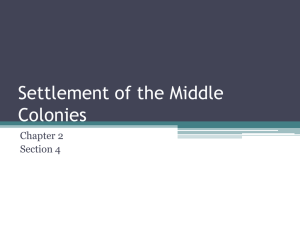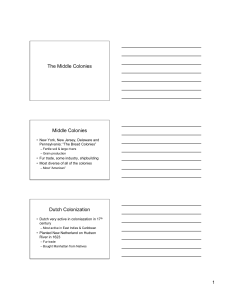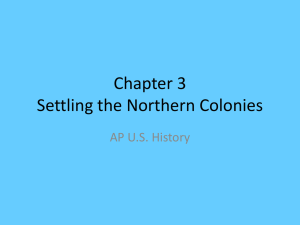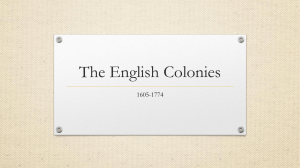These laws reflect the economic theory of MERCANTILISM that
advertisement
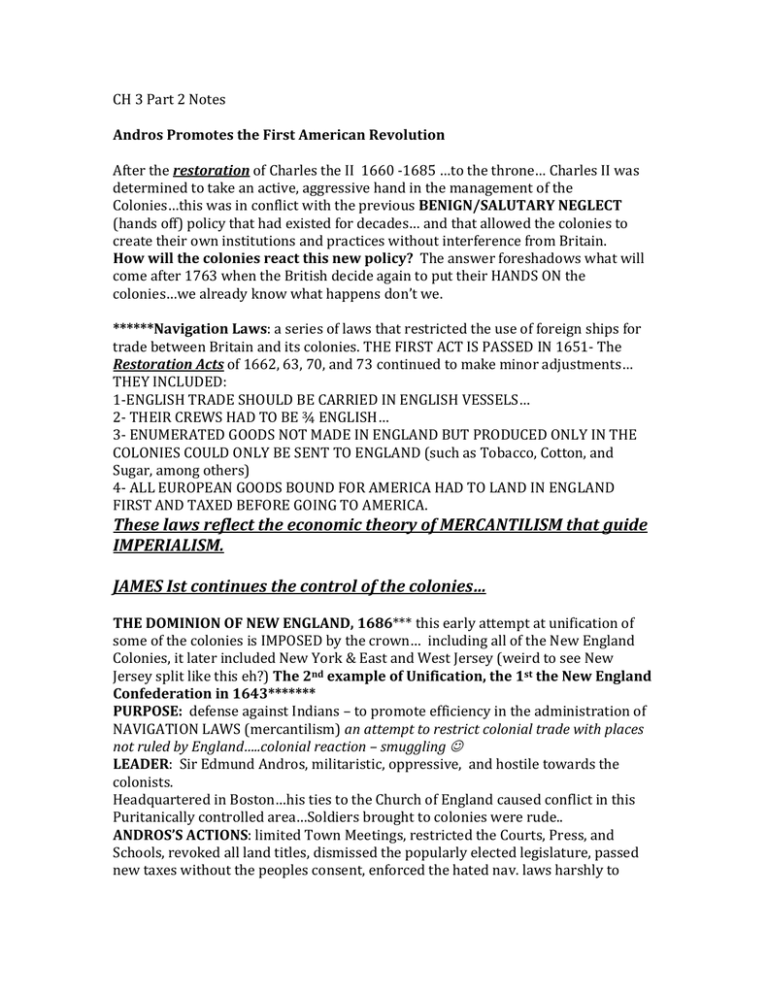
CH 3 Part 2 Notes Andros Promotes the First American Revolution After the restoration of Charles the II 1660 -1685 …to the throne… Charles II was determined to take an active, aggressive hand in the management of the Colonies…this was in conflict with the previous BENIGN/SALUTARY NEGLECT (hands off) policy that had existed for decades… and that allowed the colonies to create their own institutions and practices without interference from Britain. How will the colonies react this new policy? The answer foreshadows what will come after 1763 when the British decide again to put their HANDS ON the colonies…we already know what happens don’t we. ******Navigation Laws: a series of laws that restricted the use of foreign ships for trade between Britain and its colonies. THE FIRST ACT IS PASSED IN 1651- The Restoration Acts of 1662, 63, 70, and 73 continued to make minor adjustments… THEY INCLUDED: 1-ENGLISH TRADE SHOULD BE CARRIED IN ENGLISH VESSELS… 2- THEIR CREWS HAD TO BE ¾ ENGLISH… 3- ENUMERATED GOODS NOT MADE IN ENGLAND BUT PRODUCED ONLY IN THE COLONIES COULD ONLY BE SENT TO ENGLAND (such as Tobacco, Cotton, and Sugar, among others) 4- ALL EUROPEAN GOODS BOUND FOR AMERICA HAD TO LAND IN ENGLAND FIRST AND TAXED BEFORE GOING TO AMERICA. These laws reflect the economic theory of MERCANTILISM that guide IMPERIALISM. JAMES Ist continues the control of the colonies… THE DOMINION OF NEW ENGLAND, 1686*** this early attempt at unification of some of the colonies is IMPOSED by the crown… including all of the New England Colonies, it later included New York & East and West Jersey (weird to see New Jersey split like this eh?) The 2nd example of Unification, the 1st the New England Confederation in 1643******* PURPOSE: defense against Indians – to promote efficiency in the administration of NAVIGATION LAWS (mercantilism) an attempt to restrict colonial trade with places not ruled by England…..colonial reaction – smuggling LEADER: Sir Edmund Andros, militaristic, oppressive, and hostile towards the colonists. Headquartered in Boston…his ties to the Church of England caused conflict in this Puritanically controlled area…Soldiers brought to colonies were rude.. ANDROS’S ACTIONS: limited Town Meetings, restricted the Courts, Press, and Schools, revoked all land titles, dismissed the popularly elected legislature, passed new taxes without the peoples consent, enforced the hated nav. laws harshly to suppress smuggling….Colonists were angry…so were the British public…that led to change… The GLORIOUS REVOLUTION ENDS THE DOMINION OF NEW ENGLAND The GLORIOUS REVOLUTION in England – protestant William and Mary ascend to the throne 1689 and rule until 1702….The citizens of England depose catholic king James II and enthrone the protestant King and Queen William and Mary. (Mary was james II daughter) Colonial Change: Dominion of NE ends.. Andros escapes Boston in women’s clothes running away from a mob However, Massachusetts was made a Royal Colony revoking its ancient charter, and… THE PRIVILEGE OF VOTING WAS EXTENDED TO ALL QUALIIFIED MALE PROPERTY HOLDERS…ending the congregational churches monopoly on the ballot…unrest occurred across the colonies until new Governors were appointed and they institute another period of SALUTARY NEGLECT…(LETTING THE COLONISTS DO WHAT THEY WANT, THEIR WAY) EFFECTS: regardless of the return to neglect…more british officials were now involved in the colonies and many were incompetent…resentment will continue to build. THE MIDDLE COLONIES – OLD NETHERLANDERS AT NEW NETHERLAND NEW YORK-PENNSYLVANIA- NEW JERSEY- DELAWARE (THE MC) The Dutch (Holland/Netherlands) rebel against Spanish control late in the 1500’s with the aid of protestant England. This begins a golden age and they emerge as a global power in trade and overseas expansion of colonies… Rembrandt paints during this period…The hire HENRY HUDSON (Hudson r. in NY) to explore for the nw passage to Asia through the Americas in 1609…He claims the area for the Dutch. New Netherland (later made NY) was settled in 1623-24…The Dutch West India Co. was in control…for profit –Fur Trade…purchased Manhattan Island from the Natives (maybe why later… NY is seen as the most similar of the northern colonies to the southern colonies/ established COE/Aristocratic, etc..) - New Amsterdam (later NYC) was a COMPANY TOWN…run for the DWICo. - no: religious freedom, free speech, or democratic practices – despotic rule. - assembly created later, aristocratic due to large land grants called PATROONSHIPS (similar to plantations) one slightly larger than the entire colony of Rhode Island - New Amsterdam (later NYC) became very cosmopolitan due to its great sea port… and 18 different languages were heard by a French priest in the 1640’s (remember E Pluribus Unum) foreshadowing the coming diversity in the colonies For protection from the angry natives upset with the harsh Dutch the citizens of New Amsterdam build WALL ST. Friction with English and Swedish Neighbors The Dutch settlement, New Netherland, later to be known as New York under the English, had to deal with conflicts along its boundaries; the English in New England and the Swedish colony settled in 1638 (New Sweden, later to be known as New Jersey) along the Delaware River. The Dutch send Peter Stuyvesant (father wooden leg) and he crushes new Sweden, now under dutch control… Swedish influences are place names, people, and LOG CABINS. DUTCH RESIDUES IN NY The Dutch have to deal with a much more formable foe than the Swedes, the English. In 1664, RESTORATION PERIOD, Charles II granted the entire area to his brother the DUKE OF YORK. England sent a bunch of ships and Stuyvesant and the Dutch surrender without a shot now the English banner flew from the tip of Mass (maine not a state until 1820) to Carolina (splits in 1712) GA. NOT CREATED UNTIL, 1733. - New York retained many of the Dutch influences…Autocratic, Aristocratic; monopolistic land policies (like the south) established the Church of England (like the south) … - Dutch influences; place names (Haarlem, Hells Gate, Brooklyn), architecture, Easter eggs, Santa Claus, waffles, Sauerkraut, bowling, sleighing, skating, and Golf. Penn’s Holy Experiment in Pennsylvania Quakers – named due to the impression that they “quaked” when under deep religious emotion. They refuse to support the established churches with taxes, built simple meetinghouses, clergy was not paid, Women could speak during in religious “meetings”, take no oaths of allegiance, OPPOSED SLAVERY, and refused military service…seemed stubborn and unreasonable focused on their faith completely. William Penn, became a Quaker at 16. Quakers were persecuted in England and in the colonies (remember in New England) . PENNSYLVANIA IS FOUNDED BY PENN In 1681, last of the Restoration Colonies along with New York and Carolina, 11th colony settled (Delaware is split off from Penn. later), the King owing $$ to Penn’s father grants Penn an immense colony (Proprietary). The King called the area Penn’s Woodland (Pennsylvania) Purpose: to provide a haven for the persecuted Quakers, experiment with his liberal ideas in gov’t, and make a profit… - Becomes the BEST ADVERTISED of all of the colonies, generally truthful. Carpenters, masons, and other skilled workmen and their families were attracted by his liberal (cheap cost) land policies. Quaker Pennsylvania and its Neighbors - several thousand “squatters” (no legal right to the land they lived on) already were living in Penn. - Philadelphia –GREEK FOR Brotherly Love --(birthplace and home of the honorable Richard Tinucci) [was the most carefully planned and built city IN THE AMERICAS. - Penn BOUGHT LAND from the natives (like RI) and his treatment of Natives was so fair that most settlers were unharmed and even used the natives as babysitters some native tribes even migrate to Penn. HOWEVER, CHANGE… - as more and more non Quakers move to Penn. (esp. the Scotch-Irish) conflict begins between newcomers and Quakers/Indians. - No “Established” (tax supported Official) Church , created a popular legislature elected by landowners, Freedom of Worship was guaranteed to all (Catholics and Jews could not hold political office) - No provisions were made for colony wide defense (Quakers were pacifists) - No restrictions placed on immigration - Opposed African slavery - A rich mix of ethnic groups created a unique atmosphere that included economic opportunity, civil liberty, and religious freedom (very liberal like RI) - This atmosphere allowed for lusty growth, by 1700 3rd in Pop. Behind Va. and Mass. - Penn unfortunately dies in debtors prison but his farsighted legacy looms large in US History- esp… His legacy of civil and religious liberty and dedication to freedom of conscience and worship… a hopeful torch… Other Quaker settlements flourish nearby… New Jersey, taken by the British in 1664, originally East and West Jersey, combined in 1702 by the crown. Delaware –named after Lord De La Warr…(Jamestown) was closely associated with Pennsylvania, was made up of only two counties (three at high tide ) created its own assembly in 1703 and was not separate until the American Revolution The Middle Way in the Middle Colonies New York, New Jersey, Delaware, and Pennsylvania – had certain features in common … - Fertile soil (“Bread Colonies”) - Broad- Slow Rivers allowed for expansion West and a great Fur Trade with the Natives, Lumbering, Shipbuilding, (great large sea ports NYC, Philly, and even Albany) - A mix of both NE and the South in certain ways… Aristocratic NY like the South Industry – and Religious focus like NE… - Known as the MOST AMERICAN PART OF AMERICA… distinct in their own ways; population most ethnically mixed, most religious toleration, most democratic control, desirable land easier to acquire…. - Ben Franklin…modern minded… often considered THE most representative American personality of his era… moved here from Boston at 17 …in 1720…and found his home… unique like him BY THE END OF THE 17TH CENTURY … the American Colonies were “coming to life”… Population was growing rapidly (like rattlesnakes stated Dr. Samuel Johnson), Transportation and Communication were improving (although still not as fast as in Rome many centuries earlier), The British continue their NEGLECT leaving the Colonists to fashion their own Governments, Churches, and develop networks of intercolonial and inter-atlantic Trade… Americans began to realize that they were THRIVING… and in many cases better off than the avg. European at this time Note: change over time that you might consider for the essay
